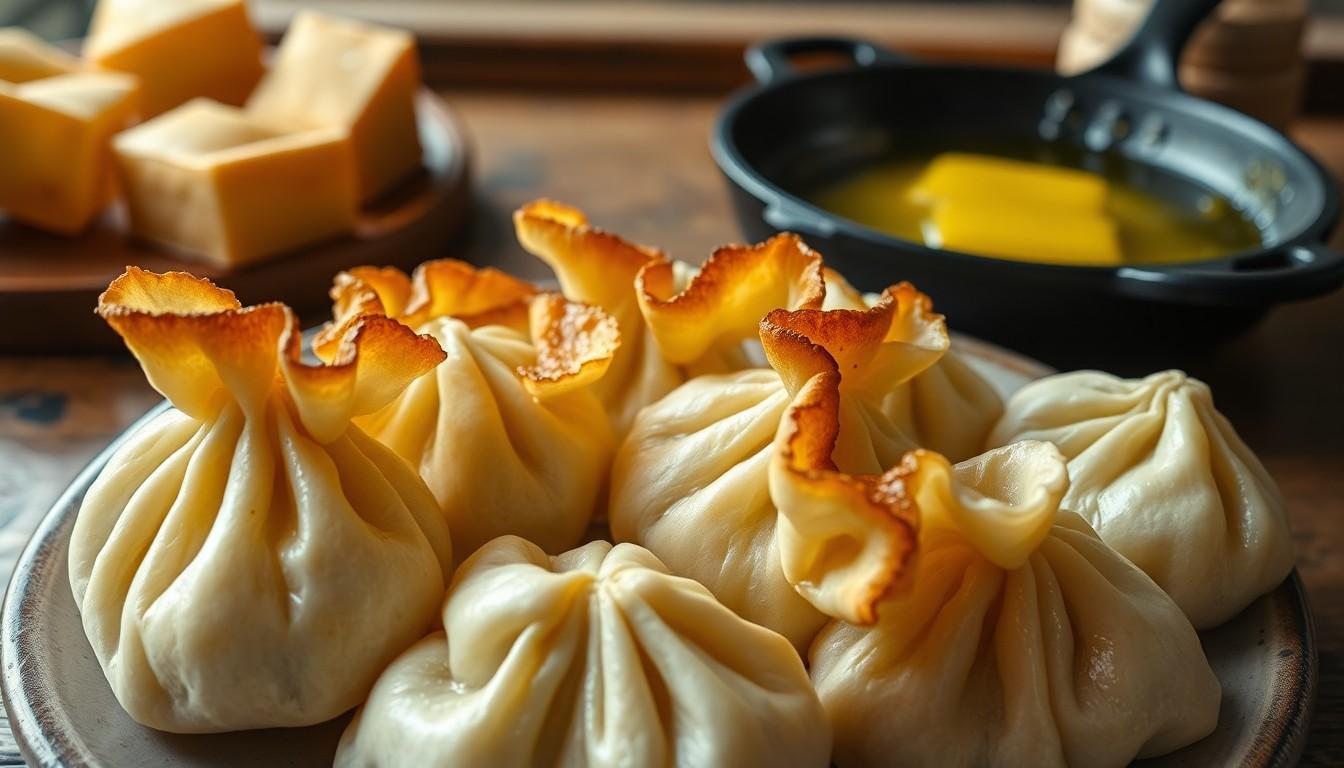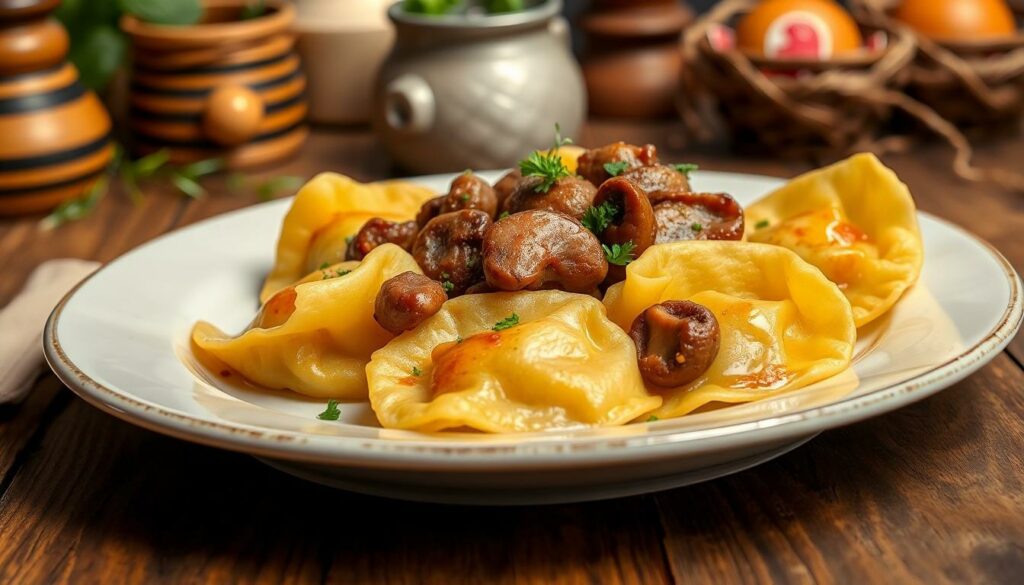Jisbeinierogi stands as one of Poland’s most beloved yet mysterious culinary treasures that’s been delighting taste buds for generations. This enigmatic dumpling variation combines traditional pierogi-making techniques with a unique twist that sets it apart from its more common cousins.
While most people know about classic pierogi filled with potatoes or sauerkraut, jisbeinierogi takes things to a whole new level with its distinctive preparation method and secret family recipes passed down through Polish kitchens. It’s like the rebel cousin of the pierogi family – breaking all the rules while somehow maintaining that authentic charm that makes Polish cuisine so special.
Jisbeinierogi
Jisbeinierogi represents a distinctive Polish dumpling variation characterized by its unique filling preparation and cooking method. These dumplings differ from traditional pierogi through their specialized dough-making process and distinctive ingredient combinations.
Origin and Cultural Significance
Jisbeinierogi emerged in the southeastern regions of Poland during the early 19th century. Local families created this variation to preserve meat during harsh winters, incorporating specific smoking techniques passed down through generations. The name “jisbeinierogi” combines “jisbein” (a type of smoked meat) with “pierogi,” reflecting its fusion of traditional dumpling-making with innovative preservation methods. Eastern European food historians document jisbeinierogi’s role in celebratory feasts, particularly during harvest festivals and winter solstice gatherings.
Traditional Ingredients
The dough for jisbeinierogi incorporates stone-ground wheat flour, farm-fresh eggs, mineral-rich mountain spring water. The signature filling combines three essential components:
-
- Smoked pork shoulder (cut into precise 3mm cubes)
-
- Wild mushrooms (specifically boletus edulis gathered from Carpathian forests)
-
- Caramelized onions (slow-cooked for 45 minutes until golden brown)
Additional aromatics include:
-
- Fresh marjoram
-
- Crushed juniper berries
-
- Black pepper (freshly ground)
-
- Sea salt (harvested from ancient Polish salt mines)
Each ingredient maintains strict proportions based on family recipes dating back 5+ generations.
How Jisbeinierogi Are Made

The preparation of jisbeinierogi involves a meticulous process that combines traditional Polish dumpling-making techniques with specialized smoking methods. The creation of these unique dumplings requires precise measurements and specific timing to achieve their distinctive texture and flavor profile.
Step-by-Step Preparation Process
-
- Mix stone-ground wheat flour with mountain spring water at 110°F to activate the gluten
-
- Incorporate farm-fresh eggs into the flour mixture until it forms a smooth elastic dough
-
- Rest the dough for 30 minutes under a damp cloth at room temperature
-
- Combine finely chopped smoked pork shoulder with sautéed wild mushrooms
-
- Add caramelized onions crushed juniper berries fresh marjoram to the filling
-
- Roll the dough to 1/8-inch thickness using a wooden rolling pin
-
- Cut 3-inch circles from the rolled dough using a metal cutter
-
- Place 1 tablespoon of filling in the center of each circle
-
- Fold and pinch edges to create a secure half-moon shape
-
- Press edges with a fork to create the signature ridged pattern
Common Cooking Methods
Jisbeinierogi preparation includes three primary cooking techniques:
Traditional Boiling
-
- Drop dumplings into salted water at 180°F
-
- Cook for 4-5 minutes until they float to the surface
-
- Remove with a slotted spoon drain thoroughly
Pan-Frying
-
- Heat butter in a cast-iron skillet to 350°F
-
- Place boiled dumplings in a single layer
-
- Fry for 2-3 minutes on each side until golden brown
-
- Heat oil in a heavy-bottomed pan to 375°F
-
- Add dumplings and 2 tablespoons of water
-
- Cover and steam for 3 minutes
-
- Remove lid allow water to evaporate creating a crispy bottom
Popular Varieties and Fillings
Jisbeinierogi features distinct regional variations across Poland, each showcasing unique combinations of ingredients and preparation methods. These variations reflect local traditions and available seasonal ingredients.
Savory Jisbeinierogi Options
Traditional savory jisbeinierogi incorporates regional meat selections beyond the classic smoked pork shoulder. The Mazovia region specializes in venison-filled jisbeinierogi with roasted chestnuts and forest herbs. Coastal areas feature Baltic cod jisbeinierogi paired with pickled mushrooms and dill. Mountain communities create versions with smoked lamb combined with aged sheep cheese and wild thyme. The Silesian variety includes duck confit with caramelized root vegetables. Each regional variation maintains the signature smoking technique while incorporating local spices and aromatics.
Sweet Jisbeinierogi Variations
Sweet jisbeinierogi emerged in the early 1900s as a festive dessert option. Popular sweet fillings include spiced apple with smoked honey and walnuts, dried plums soaked in mulled wine, and forest berry preserves with poppy seeds. The Lesser Poland region creates pear jisbeinierogi with smoked almonds and cardamom. Eastern regions feature sweet cheese filling mixed with vanilla-infused dried fruits. These dessert variations use a lighter dough enriched with cream and maintain the characteristic smoking element through smoked butter or nuts in the filling.
Where to Find Authentic Jisbeinierogi
Traditional Polish restaurants in Warsaw’s Old Town district serve authentic jisbeinierogi, particularly at established venues like Restauracja Pod Bazyliszkiem and U Fukiera. Several family-run establishments in southeastern Poland, including Karczma Pod Wielką Solą in Wieliczka, specialize in traditional recipes passed down through generations.
Regional food markets across Poland’s southeastern region offer fresh jisbeinierogi from local vendors:
-
- Krakowski Kredens markets in Kraków showcase daily handmade varieties
-
- Rzeszów’s Central Market features traditional smoked pork versions
-
- Przemyśl’s Old Town Square hosts weekend food stalls with regional specialties
Specialty Polish delis in major cities stock frozen jisbeinierogi:
-
- Delikatesy Tradycyjne locations throughout Warsaw
-
- Sklep Polski branches in Poznań
-
- Smak Regionalny stores in Gdańsk
| City | Notable Locations | Specialty Varieties |
|---|---|---|
| Warsaw | 8 restaurants, 12 delis | Smoked pork, venison |
| Kraków | 6 restaurants, 8 markets | Duck confit, Baltic cod |
| Rzeszów | 4 family venues, 3 markets | Traditional smoked pork |
| Wieliczka | 3 traditional restaurants | Mountain lamb versions |
Select Polish cultural festivals feature jisbeinierogi demonstrations by master cooks:
-
- Pierogi Festival in Kraków (August)
-
- Harvest Festival in Rzeszów (September)
-
- Winter Food Festival in Warsaw (December)
Online specialty food retailers ship frozen jisbeinierogi nationally within Poland, with temperature-controlled packaging preserving their authentic taste.
Modern Interpretations and Fusion Recipes
Contemporary chefs reimagine jisbeinierogi through innovative fusion combinations while maintaining its distinctive smoked element. Korean-inspired versions incorporate gochujang-glazed pork belly with kimchi, creating a spicy twist on the traditional filling. Japanese fusion varieties feature umami-rich shiitake mushrooms paired with wagyu beef, complemented by a light dashi-based dipping sauce.
Global ingredients enhance modern jisbeinierogi preparations:
-
- Mediterranean influences bring sun-dried tomatoes with smoked feta
-
- Mexican-inspired fillings combine chipotle-smoked chicken with cotija cheese
-
- Indian fusion varieties feature tandoori-smoked lamb with mint chutney
-
- Thai-influenced versions incorporate lemongrass-smoked shrimp with coconut curry
Leading restaurants showcase creative interpretations:
| Restaurant | Location | Signature Fusion Dish |
|---|---|---|
| Nobu Warsaw | Poland | Miso-glazed cod jisbeinierogi |
| Fusion Lab | Kraków | Thai basil duck jisbeinierogi |
| Modern Pole | Gdańsk | Mediterranean lamb jisbeinierogi |
| Urban Smoke | Warsaw | BBQ pulled pork jisbeinierogi |
Molecular gastronomy techniques transform traditional elements into contemporary presentations. Smoke-infused foams accompany deconstructed versions, while crispy quinoa adds modern texture to classic fillings. Plant-based alternatives utilize smoked mushrooms, jackfruit or tempeh to recreate traditional flavors for vegan diners.
Fine dining establishments pair these modern interpretations with craft cocktails featuring Polish spirits or natural wines. Expert mixologists create smoke-infused beverages to complement the distinctive flavors of fusion jisbeinierogi. Food festivals across Poland celebrate these innovative takes alongside traditional versions, introducing new generations to this evolving culinary tradition.
Jisbeinierogi stands as a testament to Poland’s rich culinary heritage blending traditional methods with innovative techniques. These unique dumplings showcase the country’s dedication to preserving family recipes while embracing modern interpretations. From its humble beginnings as a winter preservation method to its current status as a celebrated dish found in high-end restaurants and family kitchens alike jisbeinierogi continues to evolve.
Whether enjoyed in its traditional form or through contemporary fusion recipes this distinctive member of the pierogi family remains a cherished part of Polish gastronomy. Its enduring popularity and adaptability ensure that jisbeinierogi will continue to delight food enthusiasts for generations to come.


